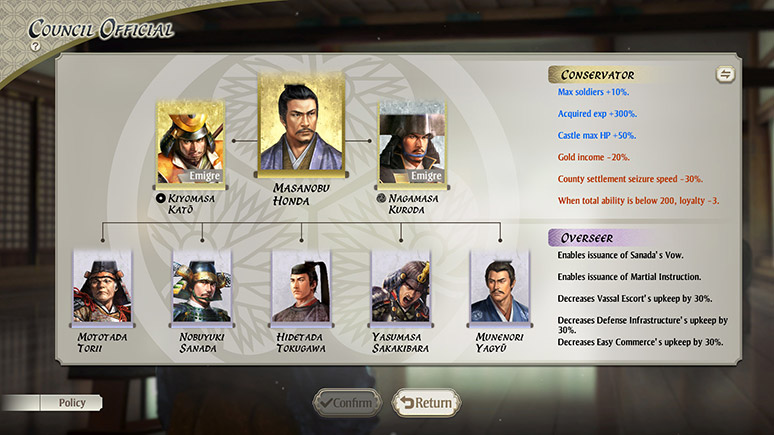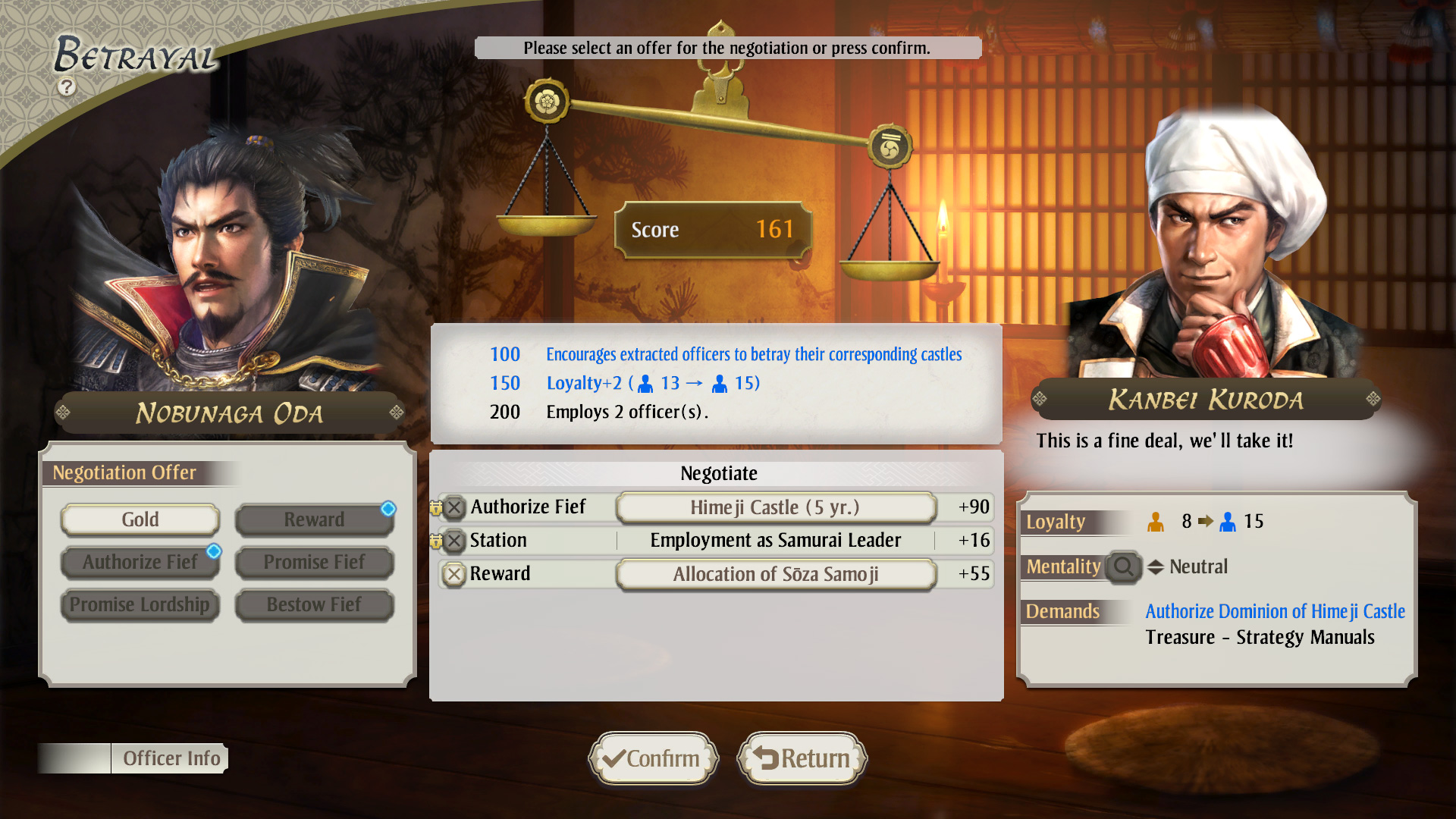Nobunaga's Ambition: Awakening is a difficult game to judge since it is the embodiment of the best and worst of Koei design philosophy. It's an attempt to reimagine the fundamentals of a forty-year old series while also serving as its culmination; for better or worse, Koei really loves trying to reinvent the wheel. Most of the series fundamentals are still here in recognizable forms, but everything must operate within the new emphases on automation and restricting agency, which I feel severely holds back the game even as it addresses a number of long-running problems.
For those who are not familiar with Nobunaga's Ambition, it is a grand strategy series set in Sengoku Japan. Unlike most western grand strategy games, the series has traditionally had a strong emphasis on personnel management, with those personnel being historical characters existing in a historical context; many entries in it have also allowed for player management of tactical battles and employed a city-builder inspired system for economic development, which overall gives NA a very distinctive character that defies easy explanation beyond saying that, no, it is not like TW: Shogun 2. To parse out what stands out in particular to me:
Good:
Personnel Management is fully fleshed out and rewarding. After being hollowed out in most of the entries of the last decade, Awakening puts its best foot forwards on one of the series' flagship mechanics by making managing your personnel require actual management again. Loyalty is something that has to be actively monitored, retainers will not unilaterally join your clan after destroying theirs and may not even want to work under you depending on a number of factors (including whether they personally like your daimyo), personnel have an actual hierarchy within your clan that determines what positions they can be assigned, how and what officers you assign where will dramatically affect the policies and strategies available to you, they may be given rewards and commendations that improve certain attributes, and personnel can be assigned actual fiefs instead of existing ephemerally within a castle. There is also a new system called direct talks, using the negotiation mechanic of diplomacy, where you will be able to negotiate directly with your and other clan's retainers over a number of possible issues. Overall it's some of the best personnel management in a Koei game.
Diplomacy is also one of the series' better iterations. While Sphere of Influence's Coalitions are sadly missing, its trust system and the ability to broker different actions with it are still around, while it also reintroduces actual negotiation from Iron Triangle (e.g. truces and tribute can be brokered in terms of exchanging gold, castles, treasures, etc. instead of just trust). Being the Shogunate gives access to a few more diplomatic options that make it feel like you are actually playing as the Shogun for the first time in a NA game, while Prestige - a new mechanic reflecting your clan's standing and can be influenced partly by negotiating titles with the Imperial Court - also adds a new dimension to diplomacy where clans may respect or scorn you depending on your relative Prestige. Again, solid.
Policies are brought back from Sphere of Influence but take a few cues from Iron Triangle's technologies. They no longer have downsides beyond the gold upkeep, but must be researched over time by officers and have their effects unlocked/improved in tiers and will always be active once researched (unless you bankrupt). Requirements for unlocking them may also be dependent on what is physically available to your clan (e.g. no mining policies if you have no gold mines) and what officers you have in your council. The only criticism I have is that they do not interact more with personnel management.
Espionage has also been brought back as a proper dimension after being neglected for many years. You can once again raze castles, sabotage supply lines, assassinate/wound enemy officers, incite riots, disrupt alliances and much more in addition to the usual arranging of defections. While the system is hindered by many of the most impressive actions being locked behind officer suggestions - perhaps understandably, but this will become a theme - it's still a welcome return to form.
Tactical Battles have strategic consequences. Many grand strategy games divorce the outcomes of their battles from any immediate consequences beyond the material losses of the troops involved. Awakening, however, has a system called Authority, where if a battle is large enough its consequences will spill over into the political sphere. If you defeat tens of thousands of enemy soldiers in a single battle or capture an important defensive base, the officers of that enemy clan will lose loyalty and some may reach out to you to defect, as will nearby castles and counties, and you will gain prestige and the respect of nearby clans (and you can be on the losing side of this). This is an excellent simulation of the realities of feudal warfare, a way to more dynamically allow smaller clans to defeat larger ones, and a welcome way to mitigate grinding (albeit at the cost of worse snowballing).
Historical Content is often a draw for people who play these games, and Koei went all in on dramatizing the setting. There are more events, and even fictional events, here than in any other NA game. Even better, you can individually toggle which events will activate in your game, and see all of an event's triggers in advance. The only downside is that there are so many events that where something should have been fleshed out more is glaring. Good examples are Nagashino and Mimikawa, two major battles with tens of thousands of combatants resulting in the deaths of dozens of important figures to the setting. Nagashino has no fictional outcome for the Takeda, being an Oda-Tokugawa event battle only (the Takeda had a version in Sphere of Influence), while Mimikawa is not even an event battle, just an event, and results in no one dying. On the other end, however, you have Sekigahara, which has multiple branching outcomes for both sides that will have massive ramifications on the world map - I'd say it's a must-play for anyone interested in the setting.
Customizable Difficultly has been a staple of NA, and has made a return after Taishi left it out. There's far more customization here than just predetermined difficulty settings; every aspect of the game mechanics, and how the AI and Player are effected by them, can be adjusted individually. So if you want a custom difficultly where the AI is as competent as possible but not too aggressive and both you and the ai recover soldiers slower but the ai gets more gold, that is entirely possible.
Editors are another staple of NA and are fully present here as well. Custom officers, historical officers, ingame editors, etc.
Graphics are not something I'd typically comment on in a strategy game, but since Awakening's predecessor, Taishi was a noticeable downgrade from its five year predecessor, Sphere of Influence, I am happy to say that Awakening at least looks like a graphical update over SoI.
Mixed:
Warfare is an unhappy marriage of Taishi and Sphere of Influence's systems. Roads from SoI have returned, but the county system that forms the basis of the map is an evolution of Taishi's - so while it allows the strategic maneuvering of the former and the army assembly of the latter, does not do either as well. This extends to the tactical field. The battlefield is more involved than before, with chokepoints and points of interest scattered across every battle map, but movement is along predetermined paths - meaning that while the battles are more tactical and resolve the total lack of an OOB that SoI/Taishi suffered from, it also reduces player interactivity. The actual mechanics of the battles are all more solid than past entries - units now have stamina, meaning they will perform worse as they continue to actively fight, smaller armies can handle large ones through careful use of terrain and flanking, and the enemy can be forced to retreat through reducing their morale instead of totally destroying their army. It's nothing as dynamic or involved as TW: Shogun 2, but if you can tolerate the predetermined movement paths it is a noticeable upgrade from SoI in terms of actual investment.
Siege Battles are also present, and can be both fun and incredibly frustrating. They can be very fun as a defender because, for a number of factors, they are lopsided in their favor, and are frustrating as an attacker for that same reason. Unlike field battles, siege battles do have a timer, with the attacker's morale (based on their army's supply) decreasing the longer a siege battle drags on (it can be increased by destroying points in the castle/defending regiments). The saving grace for this is that castles can be weakened in advance through espionage and only specifically designated defensive bases require a dedicated siege battle to capture. Every castle also has a different map and units will approach the castle tactically from their position on the strategic map, so at the very least most maps will present different avenues of attack.
Counties are a continuation of Taishi's tile system, but are actually requiring some attention. You can give them out to officers, they each have separate economic values and potentials, many counties host a unique improvement that can be built (ports, temples, churches, stables, forge towns, gold mines, etc.) and some even hold a landmark, which is a unique, tiered and powerful improvement that provides a global bonus once invested in. Roads run through counties, meaning that they may also be captured by armies on their way to attack a castle. The criticism I have of this system is that it is the most indepth part of the game's civil system rather than being a backdrop to castle development, which is frankly tragic since, while serviceable, it has very little strategy or choice to it.
Personnel AI is thankfully pretty competent in a game that requires you to rely on it. Officers will suggest appropriate and useful actions corresponding to where they are and the goals you have assigned, is capable of competently managing the economic development based on your proscribed plans, and province ai (provinces being groups of castles and personnel you have put under the control of a single AI officer). The obvious criticism is that the game requires you to rely on this to begin with, and that many of the more powerful actions are locked behind officer suggestion.
Bad:
GUI in strategy games have been deteriorating as everything becomes more 'streamlined', and Awakening is no exception: this is probably the worst GUI in a NA game. This is owing to a mixture of clearly being designed with console controls in mind and information often being obfuscated. NA titles have typically been very good at designing a GUI that is just as accessible to PC and Console players and that gives you all the information you want with minimal hassle, but that is not the case here. It's not an unworkable GUI, but there is a lot more clicking and even someone like me who doesn't typically care about GUI design noticed it.
Civil mechanics are also at their worst yet, which I would consider an accomplishment after the low that was Taishi. In Taishi the total lack of any economic development for your castles and any real strategy for the countryside was somewhat offset by agriculture and markets being separate mechanics requiring some opportunity costs and player investment, but Awakening cannot even boast that. Castles are economic centers again, but rather than requiring any city-building that rewards creativity, investment or interactivity it's little better than a Paradox game where you just slap a building into an ephemeral slot and watch a number increase (however it can't even do this well since Paradox games at least give you a lot of different numbers to work with). City-building has been the biggest casualty of Koei's efforts to reinvent the wheel; SoI, Tendou, Iron Triangle and Rise to Power all had excellent city-building mechanics that were distinct from one another but still rewarded player involvement and offered massive variation depending on location and playstyle, and this just doesn't. Because of how siege battles work you can't even customize/upgrade castles, which is something that even Taishi had in a very barebones format and is a staple of the series. There is not even a happiness system, which is especially odd given the game has made rioting a threat again.
AI Diplomacy is also awful in Awakening. Not because the AI is irrational or won't negotiate with the human, but because the devs appear to have made the conscious design decision to prevent the AI from forming dynamic alliances. This is a beyond baffling decision - the AI dynamically forming alliances has been a feature of every NA game and it has actually been very good at arranging them to counterbalance the player and other AIs. In Awakening however the AI will only make/renew alliances with clans it is scripted to during historical timeframes (and the player) and with no coalition mechanic, it is easier than ever for the human to cheese the diplomacy. The AI will dynamically vassalize clans, but clans can only be vassalized if they have no existing diplomatic relations, meaning some AIs (such as the Mori) will block their own expansion because they are scripted to keep allying the same clans over again when, in SoI for example, they would have vassalized or conquered them and moved on.
Restricting Player Agency has been the theme of this game, and while it is tolerable since the AI is actually competent, it's not something I want to continue - I want to play a game, not have the game play itself for me. NA as a series has had a l impressive history of offering multiple tools to the player to delegate issues to the AI to help reduce micro, but these were either always optional, or could be ajusted by game settings and mechanics - here it is mandatory. An excellent example is provinces and castle management. In SoI, you could only directly manage the development of castles that were within range of your main base. However, you could still directly manage a core territory, and the range of this core could be affected by policies, roads, relocating your main base, and even turned off altogether by difficulty settings; it was variable and optional. In Awakening you can only directly manage the development of counties at your main base, and the development of castles within your province, after which you have to leave it up to AI provinces. Battles suffer similarly; officer tactics traditionally have been triggered at the player's initiative, but here officers will automatically activate their own tactics when ready and will automatically assign themselves objectives on the battlefield after completing one (at the very least you can easily give them new orders). All of this would be tolerable if this game had a dedicated officer play/feudal system, but it does not, which brings me to the final point.
Reinventing the Wheel is something Koei likes doing with these games, and often it just means that interesting systems are never fully developed or built upon between iterations for the sake of giving each game a unique spin. This is particularly tragic with Awakening, as the county system, personnel management, increased emphasis on espionage and even the battle system feel like they would have fit in perfectly with SoI:Ascension's half-baked officer play, and if Awakening brought that and proper city-building I could overlook having my agency greatly restricted for the sake of a better feudalism simulation. That is unfortunately not the case, and the result is that while Awakening does not feel unfinished, it does feel incomplete.
Summary:
I would give NA:Awakening a cautious recommendation. The thing ultimately tipping this review in its favor would be that Awakening, like SoI, comes with the PuK (the single, massive expansion pack that Koei always does for these games) by default for the localized version. If you are a big fan of the setting or interested in a game based around personnel management, I can recommend this game. If you are interested in trying NA but are put off by previous games being too mechanically imposing, this is also a good place to start. If you are a long-time fan, I would suggest waiting for a sale, but say that the game is still worth your time.

















